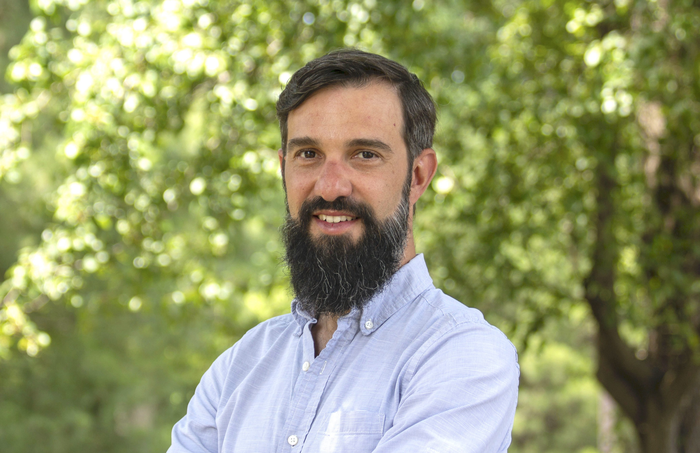NEWPORT NEWS, VA – Alexander Austregesilo, a staff scientist at the U.S. Department of Energy’s Thomas Jefferson National Accelerator Facility, has been awarded a research grant by the DOE Office of Science’s Early Career Research Program. He is one of 83 early career scientists awarded nationwide for the grant, which averages $2.5 million over five years.

Credit: DOE’s Jefferson Lab
NEWPORT NEWS, VA – Alexander Austregesilo, a staff scientist at the U.S. Department of Energy’s Thomas Jefferson National Accelerator Facility, has been awarded a research grant by the DOE Office of Science’s Early Career Research Program. He is one of 83 early career scientists awarded nationwide for the grant, which averages $2.5 million over five years.
“Supporting talented researchers early in their career is key to fostering scientific creativity and ingenuity within the national research community,” said DOE Office of Science Director Asmeret Asefaw Berhe. “Dedicating resources to these focused projects led by well-deserved investigators helps maintain and grow America’s scientific skill set for generations to come.”
At Jefferson Lab, Austregesilo is studying the particles and forces that make up matter. They fall within a group of particles called hadrons, which include the common protons and neutrons in the nucleus of the atom. He’s especially interested in unusual hadrons that are theoretically possible but have not yet been spotted.
“The primary objective of this research is the experimental study of novel forms of nuclear matter within the spectrum of hadrons,” said Austregesilo. “We want to further our understanding of the dynamics of the strong interaction.”
This strong interaction, also called the strong force, is what binds matter together. Hadrons are made of smaller particles called quarks that are bound up by the strong force through the exchange of gluons. Typically, quarks are glued together in twos or threes to form other particles.
The experiment that Austregesilo is working on is GlueX, which is being carried out in Jefferson Lab’s Experimental Hall D. His research involves searches for never-before-seen particles that have different quark groupings or more active gluons.
“GlueX was designed to look for more exotic states of matter. You may find four or five quarks together. You can also have excited gluons, which contribute to the properties of the particle,” he explained.
Austregesilo’s grant will go toward the development of new tools and resources to help GlueX scientists parse the volumes of data generated in the experiment in search of these exotic particles or hints of their existence. In 2020, the GlueX experiment collected nearly four petabytes of data. For reference, each petabyte is 1 million gigabytes.
“It’s so much data and so precise that old techniques just are not enough anymore. With the high-performance computing resources and advances in theory that are available now, you have to develop new tools and new methods to extract as much information as you can from the data that we recorded,” he said.
Austregesilo’s project is titled “Advanced Methods for Hybrid Meson Searches.” As a researcher based at a DOE national laboratory, he will receive a grant that averages $500,000 per year for the project. The five-year grant will cover salary and research expenses.
He aims to procure computer systems powered primarily by graphics processing units, or GPUs, that are similar but more powerful to the units that run popular video gaming systems. The GPUs will be specially programmed to perform a certain type of analysis, called amplitude analysis, on the GlueX experimental data. The goal is to speed up the analysis and to look for very small signals.
Austregesilo expects to employ advanced programming methods, such as machine learning and artificial intelligence, for these systematic data studies. The project also includes the development and implementation of novel real-time data processing and analysis algorithms for next-generation nuclear physics experiments. He will use these advances in the development and implementation of a future detector system for GlueX.
Austregesilo qualified for the award as a full-time employee at a DOE national lab who received a Ph.D. within the past 10 years. Research topics are required to fall within one of the DOE Office of Science’s eight major program offices.
Awardees were selected from a large pool of university- and national laboratory-based applicants. Selection was based on peer review by outside scientific experts. The final details for each project award are subject to final grant and contract negotiations between DOE and the awardees.
Further Reading:
DOE Awards $110 Million for Groundbreaking Research by 83 Early Career Scientists
DOE Early Career Research Program
Program FY 2022 Funding Opportunity Announcement
-end-
Jefferson Science Associates, LLC, manages and operates the Thomas Jefferson National Accelerator Facility, or Jefferson Lab, for the U.S. Department of Energy’s Office of Science.
DOE’s Office of Science is the single largest supporter of basic research in the physical sciences in the United States and is working to address some of the most pressing challenges of our time. For more information, visit https://energy.gov/science.




